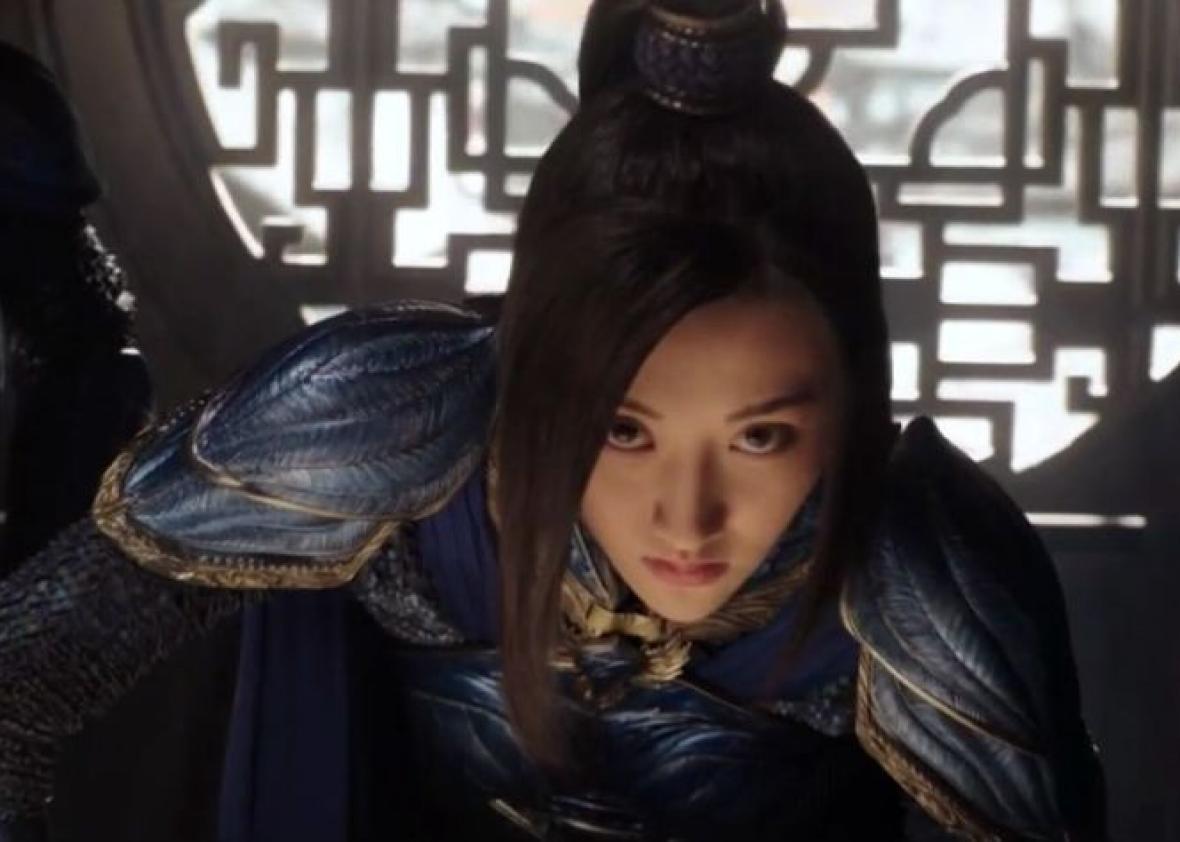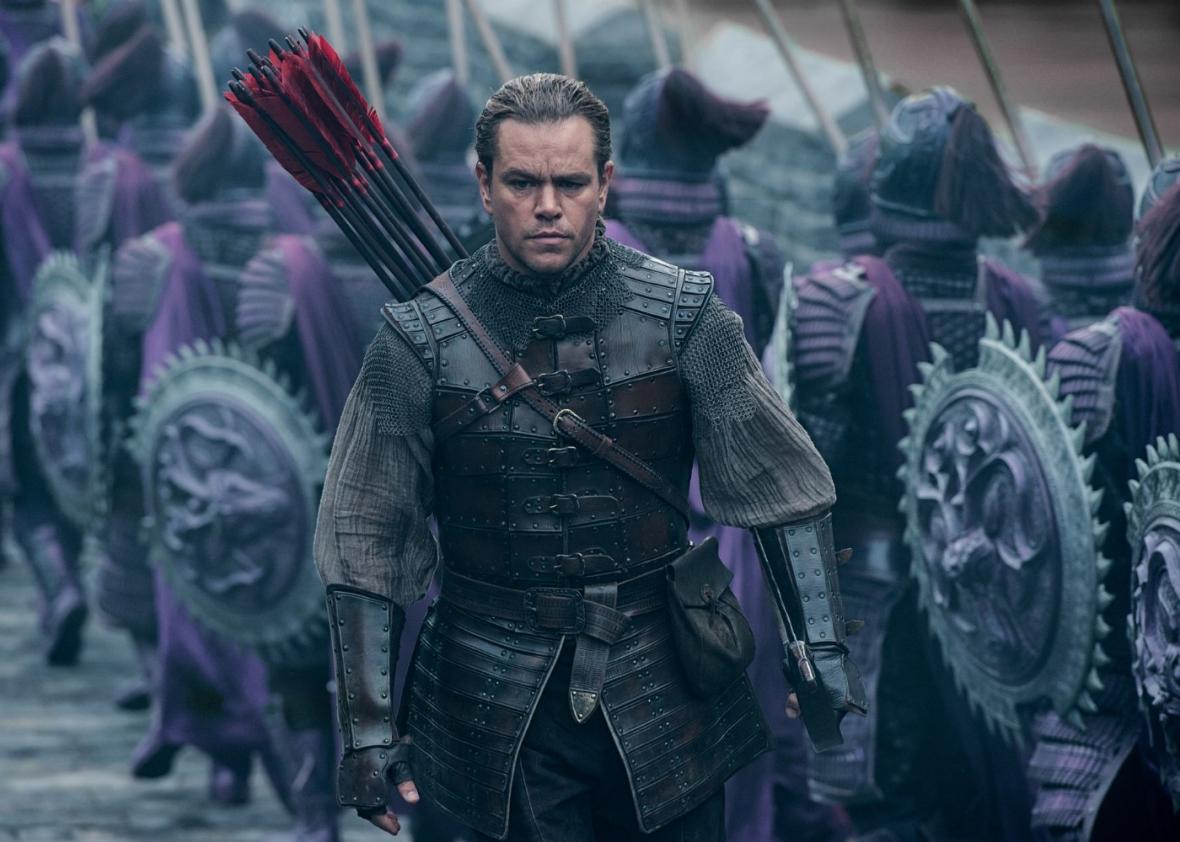Zhang Yimou’s The Great Wall is roughly two-thirds great movie, one-third terrible one. I call it “Zhang Yimou’s” less out of auteurist principle than because it has up to this point been associated almost entirely with its star, Matt Damon. From the moment it was announced that Damon would be playing the lead in a fantasy story centered on the Great Wall of China, the movie was accused, incorrectly as it turns out, of whitewashing, and, more plausibly, of being a white-savior movie in which Damon’s character teaches Chinese troops how to repel the monsters the wall was built to keep out. Amid Damon’s tone-deaf public response to the issue and the controversy around his treatment of black producer Effie Brown on Project Greenlight, the fact that The Great Wall was also a film by one of the greatest of China’s Fifth Generation directors was reduced to a virtual footnote.
Let’s deal with the one-third first. I can’t claim to be a Matt Damon completist, but this is at the very least one of the worst performances of his career. Buried under a comically shaggy beard and wig for the first part of the movie, his character becomes no more distinct once the scruff is shorn away. An, I guess, Irish fortune-seeker (the accent, whatever it’s meant to be, comes and goes) who’s come to medieval China in search of “black powder” (i.e., gunpowder), he and comrade Pedro Pascal stumble upon the Great Wall by accident—you might think it’d be hard to miss, but, at least in this universe, you’d be wrong—and discover its true purpose: protecting China from the hordes of monsters known as the Tao Tei.
The prerelease criticism of The Great Wall, most forcefully raised by Fresh Off the Boat actress Constance Wu, was that the insertion of white characters—Willem Dafoe also plays a prominent role—into a fundamentally Chinese story was an unacceptable concession to the conventional wisdom that big-budget international productions cannot succeed without a Hollywood star, who is almost always a white man. You can make a movie about Native Americans or Japanese samurai, but you’d better find a way to center it on Kevin Costner or Tom Cruise. Given that The Great Wall is predicted to come in behind The Lego Batman Movie at the U.S. box office on its opening weekend, it’s not clear that’s even true in a pragmatic sense—it opened bigger in China, although it dwindled quickly thereafter—but that argument also ignores the political ramifications of casting a white European man as the salvation of not only the Chinese characters around him but, in this case, China itself.

Universal
As a filmmaker who has been making movies in the government-controlled Chinese film industry for decades, however, Zhang Yimou is adept at the art of subversion, or at least of simultaneously serving multiple masters. It’s true that we enter The Great Wall’s story through the eyes of Damon’s William, but he’s almost immediately sidelined once we meet the Nameless Order, the Chinese forces under the command of Jing Tian’s Commander Lin. Although they managed to talk their way out of being promptly executed, William and Pascal’s Tovar spend most of the Nameless Order’s first battle against the Tao Tei tied up on a parapet, looking on in silent awe as the order’s color-coded troops deploy a dazzling array of combat strategies against their mythological foe. There are undoubtedly more scenes devoted to William than any other single character, but it still feels like the material pertaining to him has been cut in half. (For an epic fantasy, The Great Wall is startlingly short, barely over 90 minutes without the closing credits.) There either needed to more scenes centering on William or, better yet, none. Even after six writers, including The Last Samurai’s Ed Zwick and Marshall Herskovitz, finished with the script, there’s no compelling reason for William to be at the center of this story, and Damon acts like he doesn’t know why he’s there, either.
About those combat scenes, though. It’s not hard to see what drew Zhang to this story, nor is it hard to see where most of its reported $150 million budget went. The lines of extras costumed in radiant primary-color outfits seem to stretch for miles; when they run across the wall’s battlements, it’s like watching surging rivers of paint. Female warriors in flowing blue uniforms leap from the wall and plunge hundreds of feet to stab at hellish monsters before being pulled back up by the cables around their waists. Flaming cannonballs trace plumes of smoke through the air before exploding in a 3-D cascade. (I haven’t even talked about the movie’s climax, which features a flotilla of diaphanous hot-air balloons and a chase through a stained-glass tower.) In terms of spectacle, The Great Wall may not measure up to Zhang’s early-aughts trilogy of Hero, House of Flying Daggers, and Curse of the Golden Flower, but a decade after he closed that book, even an appendix is welcome.
None of this is to ignore The Great Wall’s politics by taking refuge in aestheticism. But its politics aren’t so easily nailed down; they’re slippery, verging on incoherent. It is, indisputably, a movie that inserts white characters into the story to relieve U.S. audiences of the burden of identifying with its Chinese protagonists. Zhang called it a movie with four Chinese heroes, but with the exception of Commander Lin, their stories seem to have been gutted even more thoroughly than William’s. But the white characters other than Damon’s are unreconstructed scoundrels, and although William initially stuns the Nameless Order with a display of his unparalleled archery skills, he’s often just along for the ride, outclassed by the Chinese characters in terms of both military strategy and moral fortitude. A hunk of magnetized rock that William brings with him does play a key role in attacking the Tao Tei, but it’s not him who figures out that it can be used that way. Given The Great Wall’s narrative semi-coherence, it’s hard to tell how much of this is in the script and how much is Zhang working against it, but it’s a movie that fights its own contradictions as fiercely as any of its characters do the monsters within it.
